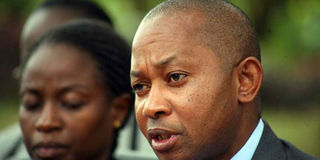Looming poll drives wedge deeper in the troubled law society

Law Society of Kenya President Erick Mutua addressing journalists in Nairobi on September 7, 2015. Elections for top positions at the Law Society of Kenya, coming up in the next six months, are widening the rifts among lawyers as different camps jostle for the coveted seats. PHOTO | EVANS HABIL | NATION MEDIA GROUP
What you need to know:
- Its secretary is receiving nominations for president, vice president, council members, members of the disciplinary tribunal, and a female member of the Judicial Service Commission, among other posts.
- But as various lawyers present their bids to be in the top organ, a renegade group is already questioning various aspects of the planned election for new leaders for the society until 2018.
- He said he would not be defending his position because the law does not allow him to run for a third term.
Elections for top positions at the Law Society of Kenya, coming up in the next six months, are widening the rifts among lawyers as different camps jostle for the coveted seats.
The society is already split into two camps. Its secretary is receiving nominations for president, vice president, council members, members of the disciplinary tribunal, and a female member of the Judicial Service Commission, among other posts.
The window for submitting nominations was opened on September 21 and closes on November 20.
But as various lawyers present their bids to be in the top organ, a renegade group is already questioning various aspects of the planned election for new leaders for the society until 2018.
Mr Edwin Sifuna, a firebrand lawyer associated with the Okoa LSK movement has questioned the legal standing of a code of conduct that will govern the election.
NO THIRD TERM
He argues that the document has not been adopted by the society’s members.
In an interview with the Sunday Nation, Mr Sifuna — who just fell short of declaring that he would run for the society’s presidency — also questioned an age limit in the society.
“You are required to have 15 years as an advocate for you to be eligible to run (for president). You cannot have a statute that goes against the spirit of the Constitution by restricting access of youth to leadership positions,” said the lawyer.
Responding to Mr Sifuna’s claim that rules for the polls were yet to be adopted, LSK President/Chairman Eric Mutua said these were not regulations but a code of conduct.
“We do not need approval by the general assembly to develop a code. In the two previous LSK elections, all candidates signed such a code,” Mr Mutua said via email.
He said he would not be defending his position because the law does not allow him to run for a third term.
Mr Sifuna’s opinion, however, is that Mr Mutua has lost his grip. On September 26, Mr Sifuna told NTV that the pro-reform side was not ready to wait until the next election to eject Mr Mutua from the helm.
SEE YOU AT THE POLLS
Exchanges between the factions — which have culminated in ugly exchanges in general meetings held in March and September — have tarnished the respect accorded to the legal profession, where decorum is a key tool of trade.
Kenyans using the social media expressed disgust at one of the exchanges, especially after Mr Sifuna told Nairobi-based lawyer Charles Kanjama on live TV that he would “meet him on the ground” for insulting his mother.
Asked whether the wrangles would show lawyers in bad light, Mr Mutua said: “It has and will continue to hurt the profession. There appears to be a need for discussion towards the establishment of a senior bar, as has happened in England and South Africa.”
The major reason for the disagreement is a proposed seven-storey International Arbitration Centre in Nairobi’s South C estate.
Some lawyers are opposed to, among other aspects, a resolution passed in September 2014 which said each advocate must contribute to the project for them to be accredited by the council.




